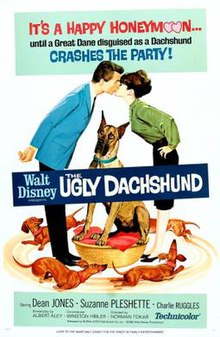
The dachshund, also known as the wiener dog or sausage dog, badger dog and doxie, is a short-legged, long-bodied, hound-type dog breed. The dog may be smooth-haired, wire-haired, or long-haired, with varied coloration.

The Hundred and One Dalmatians is a 1956 children's novel by Dodie Smith about the kidnapping of a family of Dalmatian puppies. It was originally serialized in Woman's Day as The Great Dog Robbery, and details the adventures of two dalmatians named Pongo and Missis as they rescue their puppies from a fur farm. A 1967 sequel, The Starlight Barking, continues from the end of the novel.
Bunnicula is a children's novel series. The first installment was written by James and Deborah Howe, and introduced a vampire rabbit named Bunnicula who sucks the juice out of vegetables. After the sudden death of his wife in June 1978, months before the first book saw print, Howe continued the project alone. The series consists of seven books, published between 1979 and 2006.
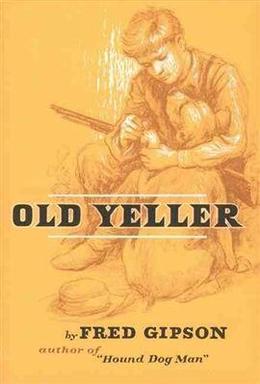
Old Yeller is a 1956 children's novel written by Fred Gipson and illustrated by Carl Burger. It received a Newbery Honor in 1957. In 1957, Walt Disney released a film adaptation starring Tommy Kirk, Fess Parker, Dorothy McGuire, Kevin Corcoran, Jeff York, Chuck Connors, and Beverly Washburn.

102 Dalmatians is a 2000 American crime comedy film produced by Walt Disney Pictures and distributed by Buena Vista Pictures Distribution. Directed by Kevin Lima from a screenplay by Kristen Buckley, Brian Regan, Bob Tzudiker and Noni White, based on a story by Buckley and Regan, it is the sequel to 101 Dalmatians (1996), which was a live-action remake of the 1961 animated film of the same name. It stars Glenn Close reprising her role as Cruella de Vil as she attempts to steal puppies for her "grandest" fur coat yet, with Ioan Gruffudd, Alice Evans, Tim McInnerny, Ian Richardson, Gérard Depardieu, Ben Crompton, Carol MacReady, Jim Carter, Ron Cook, David Horovitch, Timothy West, and Eric Idle in supporting roles. Close and McInnerny were the only two actors from the 1996 film to return for the sequel, while Adrian Biddle and Anthony Powell reprised their respective duties as cinematographer and costume designer.
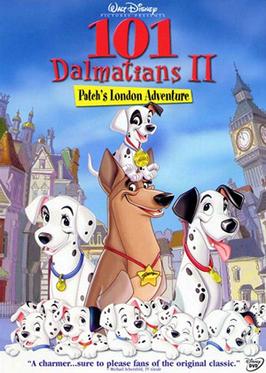
101 Dalmatians II: Patch's London Adventure is a 2003 American animated direct-to-video adventure comedy film produced by Walt Disney Television Animation with distribution by Walt Disney Home Entertainment. It serves as the sequel to Disney's 1961 animated feature film One Hundred and One Dalmatians. It was directed by Jim Kammerud and Brian Smith, with them also writing the screenplay from a story by Kammerud, Dan Root, Garrett K. Schiff, Smith and Temple Mathews and produced by Carolyn Bates and Leslie Hough. It was released on VHS and DVD on January 21, 2003, and features the voices of Bobby Lockwood, Barry Bostwick, Martin Short, Jason Alexander, Susanne Blakeslee, Kath Soucie, Jeff Bennett, and Jim Cummings. The main focus of the sequel is Patch, the loneliest of puppies, feeling "lost in a sea of spots". After he gets left behind during the Radcliffe family's moving day, he encounters his TV hero, Thunderbolt, who enlists him on a publicity campaign. Critical reception was positive.

Old Yeller is a 1957 American Western drama film directed by Robert Stevenson and produced by Walt Disney. It stars Dorothy McGuire and Fess Parker, with Tommy Kirk, Kevin Corcoran, and Chuck Connors. It is about a boy and a stray dog in post-Civil War Texas. The film is based upon the 1956 novel of the same name by Fred Gipson. Gipson also co-wrote the screenplay along with William Tunberg.
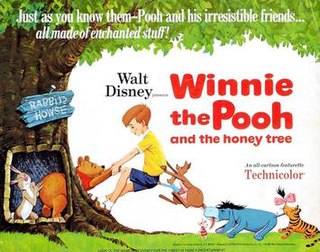
Winnie the Pooh and the Honey Tree is a 1966 American animated musical fantasy short film based on the first two chapters of Winnie-the-Pooh by A. A. Milne. The film was produced by Walt Disney Productions, and released by Buena Vista Distribution on February 4, 1966, as a double feature with The Ugly Dachshund. It was the last short film produced by Walt Disney, who died of lung cancer on December 15, 1966, ten months after its release. Its songs were written by the Sherman Brothers and the score was composed and conducted by Buddy Baker.
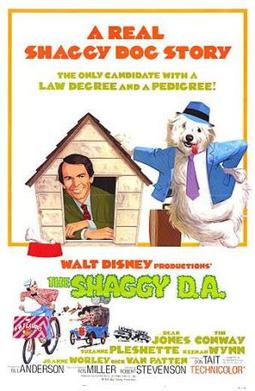
The Shaggy D.A. is a 1976 American comedy film and a sequel to The Shaggy Dog (1959) produced by Walt Disney Productions. It was directed by Robert Stevenson and written by Don Tait. As with the first film in the series, it takes some inspiration from the Felix Salten novel, The Hound of Florence.

Norman Tokar was an American director, actor and occasionally writer and producer of serial television and feature films, who directed many of the early episodes of Leave it to Beaver, and found his greatest success directing over a dozen films for Walt Disney Productions, spanning the 1950s to the 1970s.
"Sleeping Dogs Lie" is an episode of the BBC sitcom Only Fools and Horses. It was the fifth episode of series 4 and first broadcast on 21 March 1985. In the episode, Del Boy and Rodney look after Boycie and Marlene's cherished Great Dane, Duke.
Lady Greyhound was a marketing mascot of the U.S. Greyhound Lines bus company in the 1950s.
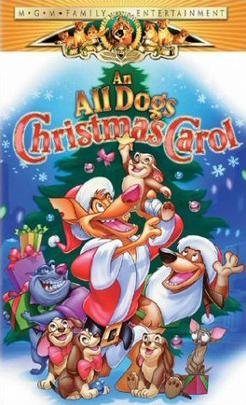
An All Dogs Christmas Carol is a 1998 direct-to-video animated musical television special based on the 1843 novella A Christmas Carol by Charles Dickens. The final installment in the All Dogs Go to Heaven film series, it also serves as the series finale to the animated series. Unlike the first two films, where the main characters are Charlie and Itchy, Carface is the focus of the story.
Dog Tales is a 1958 Warner Bros. Looney Tunes animated cartoon directed by Robert McKimson. The short was released on July 26, 1958.
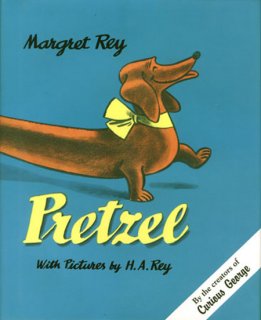
Pretzel is a children's picture book written in 1944 by Margret Rey, illustrated by H.A. Rey and first published by Harper & Brothers.

Pound Puppies is an animated children's television series developed by Wendy Klein Moss, Nancy Steingard, Paul Germain and Joe Ansolabehere for the Hub Network. It premiered on October 10, 2010 in the United States as the first Hub "original series". It also aired on YTV in Canada and on Boomerang in the United Kingdom, Ireland and Australia. Produced by Hasbro Studios, it was the second series to adapt Pound Puppies into a cartoon format. Originally a property by Tonka, Hasbro acquired Tonka itself and currently manages Pound Puppies. The plot style and music were similar to the 1960s TV series Hogan's Heroes and to films like Stalag 17 and The Great Escape. The first seven episodes of the series were animated by 9 Story Entertainment, but DHX Media/Vancouver took over to animate the series from episode 8 onwards.
Lovesick is a 1937 cartoon produced by Walter Lantz Productions featuring the later, post-1935 white-furred version of Oswald the Lucky Rabbit, together with his dog Doxie the dachshund.

The Sleepwalker is a cartoon starring Mickey's dog Pluto. It was produced by Walt Disney Productions and released by RKO Radio Pictures in 1942. The short marks the debut of Dinah the Dachshund, who later appears in Canine Casanova (1945), In Dutch (1946), Pluto's Heart Throb (1950) and Wonder Dog (1950), becoming Pluto's recurring love interest.
Albert Aley was an American producer, screenwriter, script doctor and story editor.
